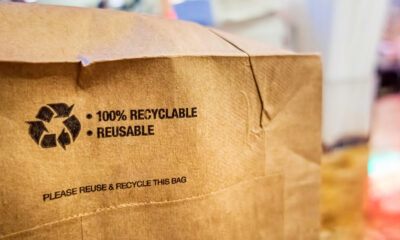

Economy
Green Business Practices To Reduce Your Footprint
As public opinion shifts towards supporting sustainable development and the need to be greener to reduce the potential impacts of climate change, more customers are looking to choose businesses that have a positive environmental impact as their preference when buying products. It is therefore of growing importance for businesses to recognise this and use practices that have a lower environmental footprint to secure future business. There are ways to reduce the amount of carbon used and energy wasted that can be implemented at a cost low enough to make it worthwhile.
One of the biggest culprits when considering wastage is paper. About 35% of the average waste stream comes from excessive paper usage, even though it is easy enough to reuse and recycle. Coming up with strategies to reduce paper use in the first place is the best place to start; sending emails rather than postal correspondence, having all bills to pay for your office or working space set up online, opting not to print receipts and so on. Instead of storing boxes and boxes of paper files to keep track of the business, move everything online and into cloud storage as well as backing everything up on external hard drives. This will take up a lot less space in the work area as well as reducing the levels of paper required. Also, consider replacing all paper stocks with that from either sustainable sources or use only recycled paper.
All important documents can be signed and verified online these days, as it is possible to digitally sign PDF files, so this means there is no need to print something out just to sign it and scan it back into a digital format. If the business wants to create an invoice and send it out, it can all be done online. Invoicehome.com offers a service that allows invoices and payment related affairs to be sent digitally and have them paid without having to print anything.
In this digital age, customers are becoming used to dealing with documents online, and often filling out a form online can be far quicker than completing it over the phone or having to post something off. Online resources also mean that customers are able to respond quicker, meaning that a business operates in a more streamlined fashion. The servers that a company’s internet resources are hosted on can also be upgraded to a server company that aims to be sustainable, mitigating the running costs and unfavourable impact by planting trees and buying carbon offsets.
Looking at other aspects of curbing energy waste, one of the most obvious but generally unheeded tips is of course to turn everything off at night. According to the Energy Saving Trust, between 9 -16% of home energy consumption comes from leaving electronics on standby, and having things like phone chargers plugged in even if they are not charging anything. Consider upgrading high-energy usage items such as high-wattage light bulbs with more energy efficient replacements, as well as higher-rated energy saving appliances such as kettles.
How the rest of the business waste is recycled and taken care of is also a key aspect of lowering environmental footprints. Almost all everyday materials can now be recycled in all locations across the UK, apart from a few types of plastics which are currently too energy-intensive to make it worthwhile recycling them. All food waste can be composted and there are many sustainably focused recycling companies that offer bespoke services to cater for business waste recycling. For electronics, there are many schemes in place to safely recycle otherwise difficult components such as mobile phones and old computers.
If the business is successful enough to be able to remodel the office or workspace, there are lots of sustainable designs and models that can hugely improve the energy usage of the building. Old windows and badly insulated floors and ceilings can contribute a lot of excessive energy wastage. By investing in eco-friendly building design, it is possible to ensure the business has a low environmental footprint by occupying an efficient building. If the business is located in the right area, it is also possible to have it run on clean, renewable energy rather than over-consuming fossil fuels and not even see a noticeable difference in cost.
If the business is large and it seems daunting and insurmountable to figure out exactly what energy is being used and where, consider having an energy audit. This will highlight every input and output and allow the situation to be easily assessed to see what instant steps can be taken to immediately lower the environmental impacts of the business.
Setting goals for sustainable development and targets for a lower environmental footprint is incredibly important to be able to measure just how effective any changes are, and make alterations to the plans as necessary. By plotting all of the changes and keeping track of all improvements it is easier to see what is making the biggest difference and what seems to be having less of an effect.
Promoting these goals around the office or work environment will encourage everyone involved in these schemes to keep track of what is going on and make everyone enthusiastic about trying to implement positive changes to the business. Educating employees about these new practices is key to making sure that the whole workforce is committed to reducing the environmental footprint across all sectors of the business.
So, it is definitely becoming easier for businesses to make a massive difference in their environmental output and to affect positive changes across whole industries. As consumers become more involved and educated about trying to reduce environmental impact with their own purchases, businesses will see the benefits of a positive energy policy.


 Environment12 months ago
Environment12 months agoAre Polymer Banknotes: an Eco-Friendly Trend or a Groundswell?

 Features11 months ago
Features11 months agoEco-Friendly Cryptocurrencies: Sustainable Investment Choices

 Features12 months ago
Features12 months agoEco-Friendly Crypto Traders Must Find the Right Exchange

 Energy11 months ago
Energy11 months agoThe Growing Role of Solar Panels in Ireland’s Energy Future




























